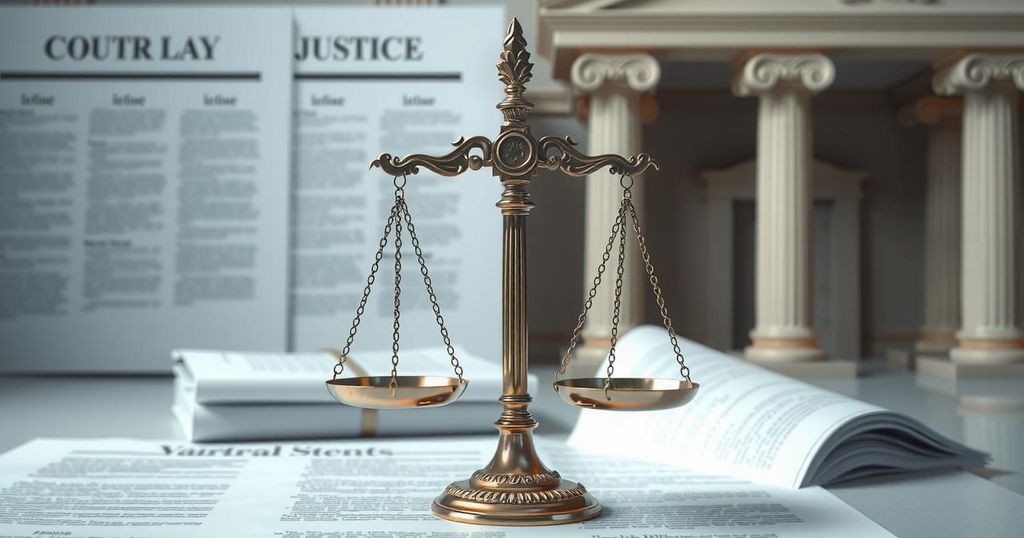ICC Prosecutor Pursues Gender Persecution Charges Against Taliban Leaders

The ICC prosecutor seeks arrest warrants against top Taliban leaders for gender persecution of women and gender nonconforming individuals in Afghanistan. The prosecution highlights systemic human rights violations, including educational bans and violence against women, reinforcing international focus on this issue. Human Rights Watch supports these actions as crucial for achieving accountability amidst the Taliban’s oppressive governance.
The International Criminal Court (ICC) prosecutor has made significant strides in seeking justice for serious human rights violations against women and girls in Afghanistan through applications for arrest warrants against two top Taliban leaders. On January 23, 2025, the prosecutor requested the charges of gender-based persecution against Taliban supreme leader Haibatullah Akhundzada and chief justice Abdul Hakim Haqqani.
The prosecutor indicated that there is substantial evidence showing that Akhundzada and Haqqani actively persecuted Afghan women, girls, and individuals perceived as nonconforming to Taliban gender norms, including members of the LGBTQ+ community. This persecution has involved systematic violations of rights such as freedom of movement, educational opportunities, and physical integrity.
Human Rights Watch commended the ICC prosecutor’s actions. Liz Evenson, the international justice director at Human Rights Watch, noted that this step should renew international focus on the Taliban’s oppression of women and gender minorities in Afghanistan. Given the lack of domestic justice, ICC warrants provide a vital pathway to accountability.
The prosecutor also indicated that the Taliban’s gender persecution is connected to broader crimes, including murder, torture, and enforced disappearances, further emphasizing the scale of abuses. Educational bans restricting girls from schooling beyond sixth grade, alongside numerous other oppressive measures, have severely limited women’s rights.
The ICC’s pretrial judges will assess the prosecutor’s warrant requests following previous investigations authorized in March 2020. This investigation paused amid attempts by the former Afghan government to halt ICC proceedings. However, judges noted that government-led cases would not sufficiently address ongoing human rights violations.
In late 2024, the situation in Afghanistan was escalated as six ICC member states expressed concerns regarding the country’s deteriorating human rights conditions by referring the case for investigation. Human Rights Watch reported that the Taliban enforced more than 100 decrees that infringe upon the rights of women and girls.
Additionally, the ICC prosecutor intends to pursue more warrants against other Taliban officials. Human Rights Watch has raised concerns about other significant crimes committed by the Taliban and ISIS-affiliated groups, advocating for a comprehensive investigation into these violations. The pressuring environment surrounding the ICC’s operations has intensified, specifically following the issuance of arrest warrants for Israeli officials.
Furthermore, various nations have initiated legal proceedings concerning Afghanistan under international conventions concerning discrimination against women, indicating potential future actions before the International Court of Justice. The ICC’s investigations encompass alleged crimes in Afghanistan since May 2003, thus extending its jurisdiction broadly.
Human Rights Watch also criticizes the ICC’s focus on Taliban and ISIS crimes while deprioritizing alleged human rights abuses by former Afghan security forces and US personnel since the invasion, indicating a need for equitable accountability across all parties involved in violations. The scale of international crimes necessitates a broad accountability approach to effectively address and mitigate impunity for longstanding human rights abuses.
The International Criminal Court (ICC) has been examining serious human rights violations in Afghanistan, particularly those targeting women and marginalized communities under Taliban rule, since 2007. The prosecutor’s recent applications for arrest warrants mark a pivotal moment in these investigations as the ICC seeks to hold accountable those responsible for systematic gender persecution. Human Rights Watch plays a crucial role in documenting these violations and advocating for international attention and action against them. The Taliban, since taking control in August 2021, have enacted numerous policies that severely restrict women’s rights and have targeted marginalized groups, worsening the human rights situation in Afghanistan. The ICC’s ongoing investigation into these abuses aims to provide a measure of justice for victims and to deter further violations of human rights in the region.
In conclusion, the ICC prosecutor’s requests for arrest warrants represent a significant step toward addressing gender-based persecution in Afghanistan. By charging senior Taliban leaders, the ICC affirms its commitment to international accountability for egregious human rights violations. The pathway to justice remains challenging, but the resumption of investigations signifies hope for the victims seeking redress and the global commitment to uphold human rights standards.
Original Source: www.hrw.org








